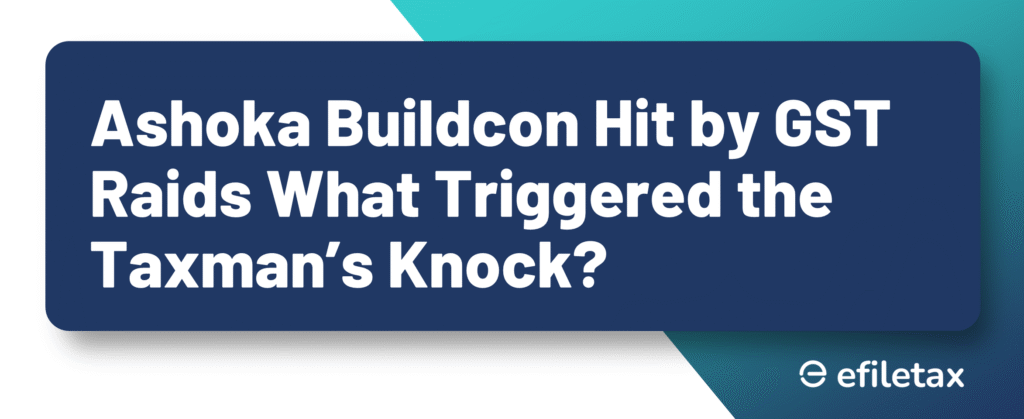
Introduction:
Ashoka Buildcon GST notice has sent shockwaves through the market, leading to a sharp fall in the company’s stock. The GST department’s search and seizure operation has sparked fresh concerns about tax compliance risks and the powers of authorities under the GST Act. In this blog, we simplify what this means for businesses, what the law allows, and how you can stay compliant and protected.
What Triggered the GST Action Against Ashoka Buildcon?
According to media reports, GST officers initiated a search and seizure operation at Ashoka Buildcon’s offices after suspected tax irregularities were flagged. While detailed findings are awaited, the operation has resulted in investor anxiety and a nearly 7–10% drop in stock value.
What Is a GST Search and Seizure?
- A taxpayer has suppressed transactions
- There is evasion of tax
Powers Under GST vs. Taxpayer Rights
| Power of Authorities | Rights of Taxpayer |
|---|---|
| Enter premises, search, seize goods | Right to see the search warrant |
| Record statements under oath | Right to remain silent or seek counsel |
| Confiscate goods if tax is unpaid | Right to receive inventory of seized goods |
| Freeze bank accounts (if necessary) | Right to appeal or approach HC if abused |
Legal Angle: What Law Says About Seizure and Safeguards
- Section 67(2): Allows seizure of books, documents, or goods.
- Rule 139: Mandates a FORM GST INS-01 for authorization of search.
- Rule 140: Requires authorities to issue a seizure memo (Form GST INS-02) listing all seized items.
📌 Important: Seizure does not imply guilt. It’s an investigation tool, not a penalty in itself.
Practical Tip: What Should You Do During a GST Search?
Here’s what CAs and tax consultants recommend:
✅ Keep all records updated and accessible (GSTR-1, 3B, EWB, etc.)
✅ Train key staff to handle officers professionally
✅ Insist on proper documentation for all actions by officers
✅ Do not obstruct the proceedings — cooperate and document everything
✅ Consult your tax advisor immediately
Expert View: Risk Exposure Post-Raids
“Even if your compliance is mostly in order, procedural lapses like missing e-way bills, delayed reconciliations, or improper ITC claims can trigger GST scrutiny,” says a senior indirect tax advisor working with infra clients.
Impact on Market and Other Businesses
- Companies with large infra contracts are under increased GST scrutiny.
- Tax authorities are reportedly using data analytics to flag red zones, particularly in input tax credit mismatches and bogus billing networks.
- Similar searches have occurred in EPC, steel, and real estate sectors recently.
GST Compliance Red Flags to Watch
🔸 Excessive input tax credit vs. output liability
🔸 Fake invoicing or unregistered vendor transactions
🔸 Undisclosed subcontractor costs
🔸 Non-matching values in GSTR-1 vs. GSTR-3B
🔸 Misuse of exemptions or concessional rates
How Efiletax Can Help
Don’t wait for a notice. Proactive GST audit and reconciliation can save you from massive penalties and business disruptions.
👉 Explore our GST Health Check Service
👉 Get a free consultation with our compliance experts
FAQ: GST Notice and Raids
Q1. Can GST officers search without informing in advance?
Yes, in search cases under Section 67, prior notice is not required.
Q2. What happens after seizure?
If irregularities are found, a demand notice under Section 73 or 74 is issued.
Q3. Is seizure the same as arrest?
No. Arrest under GST is governed by Section 69 and is used in cases of willful fraud or evasion above ₹5 crore.
Summary
Ashoka Buildcon’s GST notice and subsequent search under Section 67 has reignited concerns over compliance risks. Learn what powers GST officers have, how businesses can safeguard themselves, and practical tips to stay audit-ready and avoid penalties under India’s indirect tax regime.